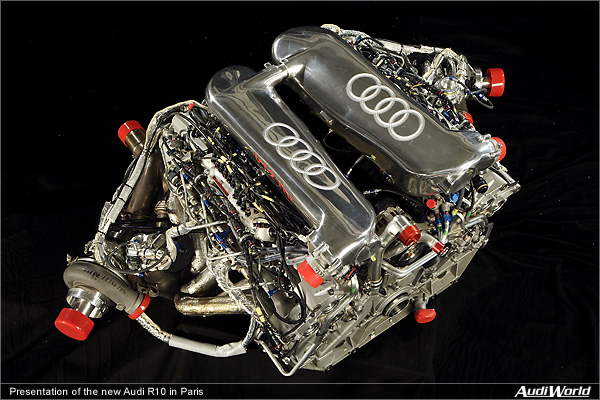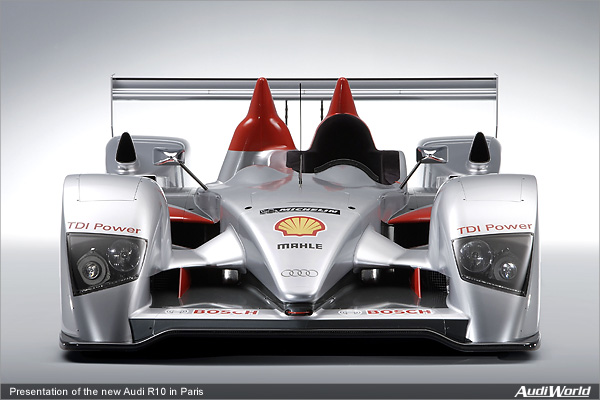V12 TDI Made Entirely from Aluminium

The heart of the Audi R10 is a completely new V12 TDI engine with a cubic capacity of 5.5 litres the maximum permitted at Le Mans. Audi ventures into previously unexplored diesel-engine terrain with power exceeding 650 hp and torque of more than 1100 Newton metres from the V12 power plant. “This engine is the specifically most powerful diesel there is in the world and, up until now, the biggest challenge that Audi Sport has ever faced in its long history, explains Ulrich Baretzky, Head of Engine Technology at Audi Sport. “There has never been anything remotely comparable. We started development with a clean sheet of paper. The V12 TDI used in the R10 is the first Audi diesel engine with an aluminium crank case. The cylinder-bank angle is 90 degrees. The V12 TDI has, like Audi production car engines, four valves per cylinder and twin overhead camshafts. The fuel induction is made by a modern “Common Rail System. The injection pressure easily exceeds the 1600 bar achieved in production cars. The ignition pressures also reach values never previously seen in any Audi engine. The turbo pressure produced by the two Garrett turbochargers is limited by the regulations to 2.94 bars absolute, the diameter of both engine air intake restrictors, stipulated by the regulations, is 2 x 39.9 millimetres. The engine management is controlled by the latest generation of Bosch Motronic (MS14). The engines power and the high torque are available to the driver practically from idling speed a speciality of diesel technology, to which the Audi drivers must now become accustomed. The usable power band lies between 3000 and 5000 revs per minute. Unfamiliar to the driver at this early stage, is the low noise level and, unique for a racing engine, the smooth running V12 TDI power unit. At high speeds the powerful 650 hp engine can not be heard from the Audi R10 prototypes “open cockpit while there is also hardly any vibration. On the outside, the modern twelve-cylinder produces a faint, but sonorous sound that quite possibly nobody would identify as a diesel power unit at first. The new R10 can only be recognised acoustically as a diesel-powered sportscar during the warming-up process or in the pit lane. There are no visual signs that a diesel power unit is at work in the back of the R10. It goes without saying that the V12 TDI is equipped with a pair of diesel particle filters for the 24 Hours of Le Mans. Flashes of flame from the exhaust, which are created by unburned petrol in spark-ignition engines, are not seen coming from the R10. One of the diesel engines biggest advantages is the low fuel consumption, especially at part-throttle and overrun. However, when compared to more classic circuits which demand a higher ratio of part throttle, the lower specific consumption will hardly be noticeable at Le Mans because the quota of full-throttle is almost 75 percent. The enormous torque of over 1,100 Newton metres not only posed previously unforeseen demands in the development of the R10 drive train. Even the latest generation of engine dynamometers at Audi Sport had to be reequipped with special gearboxes capable of withstanding the unusual forces. Inside the V12 TDI, the extremely high pressures in particular create forces never seen before in a racing engine. However, the main target of the Audi technicians is to reach the reliability level of the R8, which never recorded a single engine failure in the 77 races it has contested to date.
|

